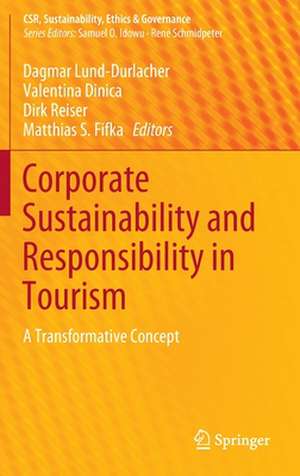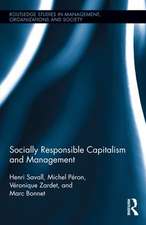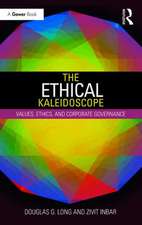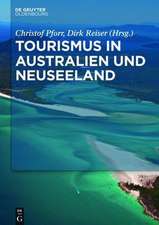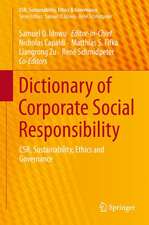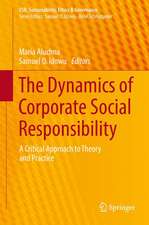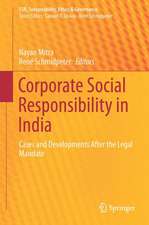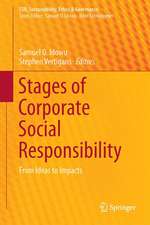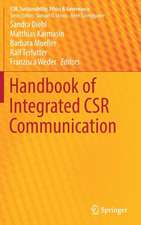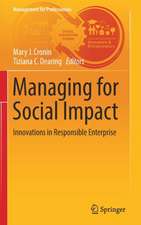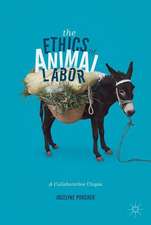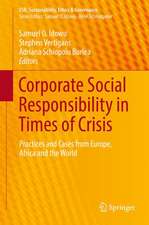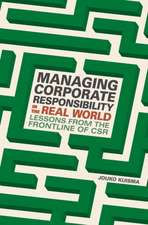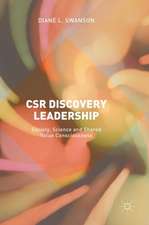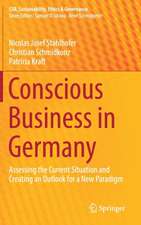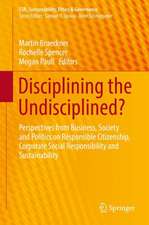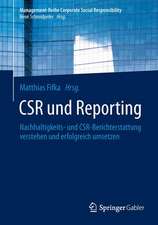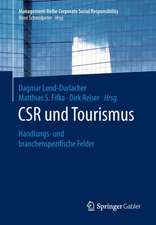Corporate Sustainability and Responsibility in Tourism: A Transformative Concept: CSR, Sustainability, Ethics & Governance
Editat de Dagmar Lund-Durlacher, Valentina Dinica, Dirk Reiser, Matthias S. Fifkaen Limba Engleză Hardback – 14 mai 2019
The book is divided into three parts, the first of which elaborates on strategic drivers and rationales for CSR. In turn, the second part introduces readers to design approaches for CSR programs and envisaged impacts, while part three focuses on implementation, certification, reporting, and possible outcomes. Each part offers a mixture of theoretical perspectives, synthesis analyses and case studies. The respective chapters tackle a broad spectrum of tourism sub-sectors, e.g. the cruise industry, aviation, gastronomy, nature-based tourism, and urban destinations.
Din seria CSR, Sustainability, Ethics & Governance
-
 Preț: 400.75 lei
Preț: 400.75 lei - 20%
 Preț: 879.88 lei
Preț: 879.88 lei - 18%
 Preț: 897.65 lei
Preț: 897.65 lei - 18%
 Preț: 1002.13 lei
Preț: 1002.13 lei - 18%
 Preț: 1013.02 lei
Preț: 1013.02 lei - 15%
 Preț: 645.28 lei
Preț: 645.28 lei - 20%
 Preț: 690.12 lei
Preț: 690.12 lei - 15%
 Preț: 646.62 lei
Preț: 646.62 lei - 15%
 Preț: 505.30 lei
Preț: 505.30 lei - 15%
 Preț: 647.40 lei
Preț: 647.40 lei - 24%
 Preț: 700.88 lei
Preț: 700.88 lei -
 Preț: 366.69 lei
Preț: 366.69 lei -
 Preț: 412.06 lei
Preț: 412.06 lei - 19%
 Preț: 549.68 lei
Preț: 549.68 lei - 20%
 Preț: 567.86 lei
Preț: 567.86 lei - 20%
 Preț: 575.49 lei
Preț: 575.49 lei - 24%
 Preț: 750.45 lei
Preț: 750.45 lei - 24%
 Preț: 823.00 lei
Preț: 823.00 lei - 18%
 Preț: 1003.70 lei
Preț: 1003.70 lei - 24%
 Preț: 692.28 lei
Preț: 692.28 lei - 20%
 Preț: 567.86 lei
Preț: 567.86 lei -
 Preț: 377.77 lei
Preț: 377.77 lei - 19%
 Preț: 472.32 lei
Preț: 472.32 lei -
 Preț: 367.40 lei
Preț: 367.40 lei - 20%
 Preț: 576.30 lei
Preț: 576.30 lei - 20%
 Preț: 587.28 lei
Preț: 587.28 lei - 20%
 Preț: 565.08 lei
Preț: 565.08 lei - 20%
 Preț: 565.89 lei
Preț: 565.89 lei - 20%
 Preț: 568.19 lei
Preț: 568.19 lei - 24%
 Preț: 822.45 lei
Preț: 822.45 lei - 20%
 Preț: 558.87 lei
Preț: 558.87 lei - 24%
 Preț: 1160.84 lei
Preț: 1160.84 lei - 24%
 Preț: 792.83 lei
Preț: 792.83 lei - 20%
 Preț: 573.76 lei
Preț: 573.76 lei - 24%
 Preț: 583.99 lei
Preț: 583.99 lei -
 Preț: 375.76 lei
Preț: 375.76 lei - 24%
 Preț: 688.02 lei
Preț: 688.02 lei -
 Preț: 388.13 lei
Preț: 388.13 lei - 24%
 Preț: 744.57 lei
Preț: 744.57 lei - 20%
 Preț: 593.48 lei
Preț: 593.48 lei - 20%
 Preț: 573.76 lei
Preț: 573.76 lei - 19%
 Preț: 437.63 lei
Preț: 437.63 lei -
 Preț: 365.93 lei
Preț: 365.93 lei -
 Preț: 353.51 lei
Preț: 353.51 lei -
 Preț: 366.69 lei
Preț: 366.69 lei
Preț: 1010.03 lei
Preț vechi: 1231.73 lei
-18% Nou
Puncte Express: 1515
Preț estimativ în valută:
193.27€ • 202.30$ • 160.86£
193.27€ • 202.30$ • 160.86£
Carte tipărită la comandă
Livrare economică 01-15 aprilie
Preluare comenzi: 021 569.72.76
Specificații
ISBN-13: 9783030156237
ISBN-10: 3030156230
Pagini: 483
Ilustrații: XV, 382 p.
Dimensiuni: 155 x 235 mm
Greutate: 0.74 kg
Ediția:1st ed. 2019
Editura: Springer International Publishing
Colecția Springer
Seria CSR, Sustainability, Ethics & Governance
Locul publicării:Cham, Switzerland
ISBN-10: 3030156230
Pagini: 483
Ilustrații: XV, 382 p.
Dimensiuni: 155 x 235 mm
Greutate: 0.74 kg
Ediția:1st ed. 2019
Editura: Springer International Publishing
Colecția Springer
Seria CSR, Sustainability, Ethics & Governance
Locul publicării:Cham, Switzerland
Cuprins
Part I: Introduction.- Part II: Assessing Business Behaviours and Leadership from the Standpoint of CSR 2.0.- Part III: CSR 2.0 Implementation.
Notă biografică
Dagmar Lund-Durlacher is Full Professor and Head of the Department of Tourism and Service Management at MODUL University Vienna. From 2007 to 2015 she served as the Dean of the Undergraduate School at MU. She has worked on a number of international and EU funded projects within the area of consumer behaviour and sustainable tourism, with a focus on sustainable gastronomy and sustainable food during the last three years. She is very well connected to the academic as well as industry tourism communities. Between 2010 and 2014 she chaired the BEST (Building Excellence in Sustainable Tourism) Education Network. She is also scientific and technical advisor for a number of international associations (UNEP, Futouris, etc.). Her current research interests focus on the areas of corporate responsibility emphasizing on innovative CSR management approaches, climate change and mobility in tourism as well as sustainable food operations. She obtained her PhD from Vienna University of Economicsand Business in the field of Business and Social Sciences.
Matthias S. Fifka is Head of the Department of Business and Economics and Full Professor for Strategic and Values Management at the University Erlangen-Nuernberg. He is also a visiting professor at Shanghai Jiao Tong University and Nanjing University, the University of Dallas, and Maastricht School of Management. Moreover, he serves on various national and international committees and advices companies and governmental organizations. His research and teaching focuses on strategic management, values in organizations, leadership, sustainability/CSR management, corporate governance and business ethics. He has published 13 books and more than 40 articles in renowned journals and books and serves as member of the editorial board and reviewer for several journals. He frequently contributes articles and interviews to a variety of international media.
Valentina Dinica is an Associate Professor in Sustainability and Public Policy at Victoria University of Wellington in New Zealand. She published extensively on the policy and governance aspects of sustainability challenges, particularly the relationship between tourism and Protected Area bio-environmental outcomes, water governance, the diffusion of renewable energy technologies and energy efficiency. Dr Dinica's teaching covers a wide range of courses, from environmental and sustainability policy, to policy analysis and methods courses. She served as Program Director for Undergraduate Programs in Public Policy at the School of Government and member of the University Steering Group for the Distinctiveness Theme on Sustainability and Resilience. Dr Dinica is currently the Convenor of the Environment Policy and Politics Network of the New Zealand Political Science Association. She obtained her PhD degree at University of Twente in the Netherlands where she was involved in numerous projects with funding from local, national and European government agencies.
Dirk Reiser is Full Professor for Sustainable Tourism Management at the Rhine-Waal University of Applied Sciences in Kleve, Germany. He has taught in a variety of countries, including New Zealand, Australia, Thailand, Indonesia and Kazachstan. His research interests are sustainable tourism, in particular zoo tourism and sustainable destination management, CSR in tourism, tourism education, marketing and tourism-related environmental management. He is also a research affiliate at the International Center for Sustainable Tourism and Hospitality at the University of Mauritius. In the past, Dr. Reiser was an expert at the panel of the European Tourism Indicator System (ETIS) for destinations and a member of the International Association of Scientific Experts in Tourism (AIEST).
Textul de pe ultima copertă
This book offers essential insights into how the world's second largest industry, tourism, is responding to challenges involved in expanding the corporate social responsibility (CSR) concept to corporate sustainability and responsibility, referred to as CSR 2.0. It analyzes the typical setup of tourism with various types of commercial agents: corporations, small and medium sized enterprises, public-private partnerships, social enterprises and local cooperatives. In addition, the book examines a broad range of voluntary initiatives, the effectiveness of these efforts, and how contextual and wider policy features shape these relationships.
The book is divided into three parts, the first of which elaborates on strategic drivers and rationales for CSR. In turn, the second part introduces readers to design approaches for CSR programs and envisaged impacts, while part three focuses on implementation, certification, reporting, and possible outcomes. Each part offers a mixture of theoretical perspectives, synthesis analyses and case studies. The respective chapters tackle a broad spectrum of tourism sub-sectors, e.g. the cruise industry, aviation, gastronomy, nature-based tourism, and urban destinations
The book is divided into three parts, the first of which elaborates on strategic drivers and rationales for CSR. In turn, the second part introduces readers to design approaches for CSR programs and envisaged impacts, while part three focuses on implementation, certification, reporting, and possible outcomes. Each part offers a mixture of theoretical perspectives, synthesis analyses and case studies. The respective chapters tackle a broad spectrum of tourism sub-sectors, e.g. the cruise industry, aviation, gastronomy, nature-based tourism, and urban destinations
Caracteristici
Provides a comprehensive appraisal of corporate social responsibility's impact in the tourism sector Pursues a multidisciplinary and holistic approach, including corporate governance, strategic management and public policy Presents concrete examples, case studies and best practices of CSR implementation in connection with different types of commercial tourism actors, partnerships and tourism sub-sectors Indicates the strong importance of necessary change within the tourism industry towards a new approach to CSR Discusses the new approach to corporate sustainability and responsibility in the tourism industry
